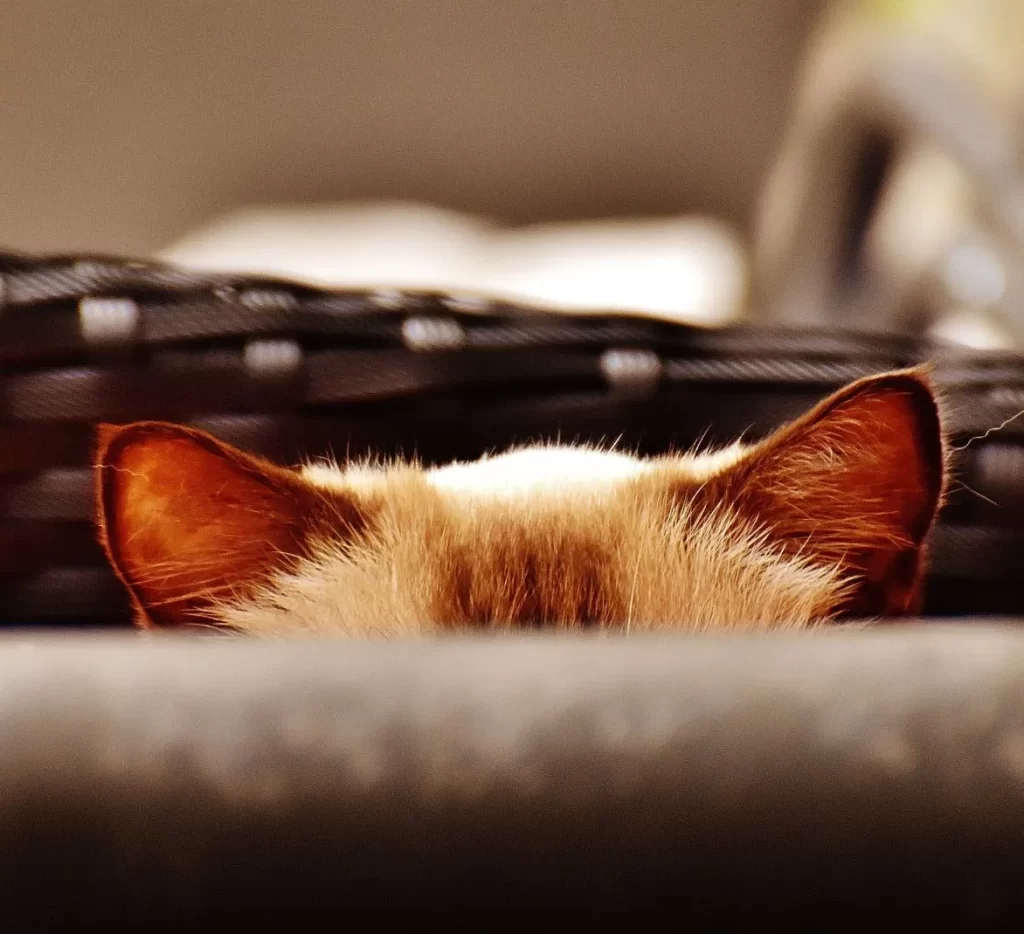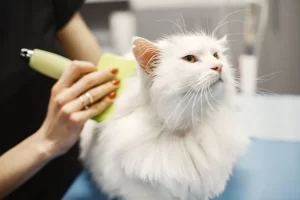Cat ear infections are a common issue faced by pet owners. These infections can cause a range of symptoms, from itching and redness to discharge and pain, and can have serious consequences if left untreated. In this article, we will cover everything you need to know about cat ear infections, from home remedies and treatments to causes and symptoms. Whether you have a cat with a current infection or simply want to learn more about this common problem, this guide is an essential resource for all cat owners. We will cover the importance of prompt veterinary care, the benefits of home remedies, and tips for keeping your cat’s ears healthy and free of infections. With this information, you can ensure that your cat stays happy, healthy, and free of discomfort.
Table of Contents
ToggleCauses of ear infections in cats
Ear infections in cats can be caused by a variety of factors, ranging from parasites and allergies to genetics and immune system deficiencies. Some important causes are:
- Bacteria: Bacterial infections can be caused by Staphylococcus or Pseudomonas and can lead to inflammation and swelling in the ear.
- Yeast: Overgrowth of yeast in the ear can cause infections, especially in cats with allergies or compromised immune systems. Several home remedies have shown promising results in treating yeast infections in cats.
- Mites: Ear mites, a common parasite in cats, can cause inflammation and infections.
- Allergies: Allergic reactions to food, environmental allergens, or flea bites can cause ear infections in cats.
- Foreign objects: Objects such as grass seeds, dirt, or other debris can become trapped in the ear, leading to infection.
- Moisture: Excessive moisture in the ears, from bathing or swimming, can create a breeding ground for bacteria and yeast.
- Hormonal imbalances: Thyroid or adrenal gland problems can weaken the immune system and increase the risk of ear infections.
- Genetics: Some breeds, such as Siamese and Persian cats, are more prone to ear infections due to their ear anatomy.
- Immunosuppression: Cats with a weakened immune system are more susceptible to ear infections.
- Abnormal ear anatomy: Cats with floppy ears, narrow ear canals, or hair in the ear canals are at an increased risk of ear infections.
Symptoms of ear infections in cats
Ear infections in cats can produce a range of symptoms, which can indicate the presence of an underlying issue in the ear. Here is a list of common symptoms to look out for:
- Scratching or pawing at the ear: Cats may excessively scratch or paw at the affected ear in an attempt to alleviate discomfort.
- Head shaking: Cats may shake their head or tilt their head to the side to try and relieve pressure or pain in the ear.
- Odor: A strong, foul odor from the ear can indicate a bacterial or yeast infection.
- Redness and swelling: Inflammation and swelling in the ear can be a sign of an infection or injury.
- Discharge: Yellow, brown, or bloody discharge from the ear can indicate a problem and should be examined by a veterinarian.
- Loss of balance: Cats with inner ear infections may have trouble maintaining their balance.
- Pain or discomfort: Cats may show signs of pain or discomfort, such as crying out or avoiding being touched near the ear.
- Hearing loss: Prolonged or severe ear infections can cause temporary or permanent hearing loss.
Benefits of home remedies for cat ear infection
Using home remedies to treat a cat’s ear infection can offer several benefits:
- Convenience: Treating ear infections at home can be more convenient and less stressful for both the cat and the owner.
- Cost-effective: Home remedies are often less expensive than traditional veterinary treatments, making them an attractive option for pet owners on a budget.
- Natural: Many home remedies use natural ingredients, such as vinegar, coconut oil, or garlic, which are generally safe and gentle for cats.
- Avoiding drugs: Home remedies can help to avoid the use of drugs that may have adverse side effects for the cat.
- Supporting veterinary treatment: Home remedies can be used in conjunction with veterinary treatment to provide additional relief and support for the cat’s recovery.
It’s important to note that home remedies should never replace veterinary care, especially in severe or complicated cases, and should always be used under the guidance of a veterinarian.
Home remedies for cat ear infection
Here are the main home remedies that can be used to treat a cat’s ear infection:
- Olive oil: Olive oil is a natural moisturizer that can help to soothe an inflamed ear and reduce pain. Simply apply a few drops to the affected ear and massage gently.
- White vinegar: White vinegar can help to neutralize odors and dry out the ear, reducing the risk of further infections. Mix equal parts water and white vinegar and use a dropper to apply a few drops to the affected ear.
- Garlic: Garlic has natural antifungal and antibacterial properties that can help to treat ear infections. Crush a garlic clove and mix it with olive oil, then apply a few drops to the affected ear.
- Tea tree oil: Tea tree oil has antifungal and antimicrobial properties that can help to treat ear infections. Dilute a few drops of tea tree oil in olive oil and apply it to the affected ear.
- Coconut oil: Coconut oil has antifungal and antibacterial properties that can help to soothe the ear and reduce pain. Apply a small amount to the affected ear and massage gently.
- Apple cider vinegar: Apple cider vinegar can help to restore the natural pH balance of the ear, reducing the risk of infection. Mix equal parts water and apple cider vinegar and use a dropper to apply a few drops to the affected ear.
- Hydrogen peroxide: Hydrogen peroxide can help to remove debris and dry out the ear, reducing the risk of infection. Use a dropper to apply a few drops of hydrogen peroxide to the affected ear.
- Witch hazel: Witch hazel has anti-inflammatory properties that can help to reduce swelling and discomfort in the ear. Apply a few drops of witch hazel to a cotton ball and gently clean the affected ear.
- Aloe vera: Aloe vera has anti-inflammatory properties that can help to soothe the ear and reduce pain. Apply a small amount of aloe vera gel to the affected ear.
- Echinacea: Echinacea is a natural herb that can help to boost the immune system and reduce inflammation. Mix a few drops of echinacea tincture with olive oil and apply to the affected ear.
- Goldenseal: Goldenseal is a natural herb that has antifungal and antibacterial properties that can help to treat ear infections. Mix a few drops of goldenseal tincture with olive oil and apply to the affected ear.
- Colloidal silver: Colloidal silver is a natural antifungal and antibacterial agent that can help to treat ear infections. Apply a few drops of colloidal silver to the affected ear.
- Zinc: Zinc is an essential mineral that can help to boost the immune system and reduce inflammation. Apply a small amount of zinc oxide ointment to the affected ear.
- Vitamin E: Vitamin E is a natural antioxidant that can help to reduce inflammation and boost the immune system. Apply a small amount of vitamin E oil to the affected ear.
- Baking soda: Baking soda can help to neutralize odors and dry out the ear, reducing the risk of further infections. Mix a small amount of baking soda with water to form a paste, and use a cotton ball to gently clean the affected ear.
It’s important to note that home remedies should never replace veterinary care, especially in severe or complicated cases, and should always be used under the guidance of a veterinarian.
Precautions when using home remedies
Here are some precautions to keep in mind when using home remedies for cat ear infections:
- Consult with a veterinarian: Always consult with a veterinarian before using any home remedy on your cat, as some remedies may not be safe or suitable for your pet’s specific health needs.
- Avoid using cotton swabs: Avoid using cotton swabs to clean the ear as this can push debris further into the ear canal and cause damage.
- Watch for signs of pain or discomfort: Watch for signs of pain or discomfort when applying the remedy, and stop if you observe any adverse reactions.
- Use the remedy as directed: Follow the usage instructions carefully, and do not use more or less of the remedy than recommended.
- Keep the ear clean: Keep the affected ear clean and free of any discharge, and continue to monitor it for any changes or signs of improvement.
- Avoid using essential oils: Essential oils should not be used in the ears as they can cause serious damage to delicate skin and tissues.
- Avoid self-diagnosis: Do not self-diagnose and treat your cat’s ear infection without proper veterinary care, as ear infections can be caused by a variety of underlying factors and may require different treatments.
Don’t ignore other symptoms: If you observe any other symptoms such as changes in appetite, behavior, or difficulty walking, seek veterinary care immediately.
Tips for preventing ear infections in cats
Here are some tips for preventing ear infections in cats:
- Keep ears clean: Regularly clean your cat’s ears to remove any debris, wax, or moisture that can cause infections.
- Avoid excessive moisture: Keep your cat’s ears dry and avoid exposing them to excessive moisture, such as from swimming or bathing.
- Treat underlying conditions: Treat any underlying health conditions such as allergies, mites, or skin infections that can increase the risk of ear infections.
- Monitor for signs of infections: Regularly check your cat’s ears for signs of infections, such as redness, swelling, or discharge, and seek veterinary care immediately if you observe any changes.
- Feed a balanced diet: Provide your cat with a balanced diet that includes all the essential nutrients, vitamins, and minerals needed to support overall health and immune function.
- Avoid harsh chemicals: Avoid exposing your cat to harsh chemicals or products that can irritate the ears or cause infections.
- Check for fleas and ticks: Regularly check for fleas and ticks and treat your cat accordingly to prevent them from transmitting infections. Besides ear infections, there are a lot of things that fleas do to cats!
Provide a clean and comfortable environment: Ensure that your cat’s living environment is clean, comfortable, and free of any potential irritants or allergens that can increase the risk of ear infections.
Cleaning and maintaining cat ears
Here are some tips for cleaning and maintaining cat ears:
- Use a gentle cleanser: Use a gentle, cat-safe cleanser specifically designed for ear cleaning.
- Avoid cotton swabs: Avoid using cotton swabs to clean the ear as this can push debris further into the ear canal and cause damage.
- Use a soft cloth or cotton ball: Use a soft cloth or cotton ball to gently clean the outer ear flap and around the ear opening.
- Keep ears dry: Make sure to keep the ears dry, especially after bathing or swimming.
- Clean regularly: Clean your cat’s ears regularly, as part of their grooming routine, to remove any debris, wax, or moisture that can cause infections.
- Monitor for signs of infections: Regularly check your cat’s ears for signs of infections, such as redness, swelling, or discharge, and seek veterinary care immediately if you observe any changes.
- Use a drying agent: If your cat’s ears are prone to moisture or wax buildup, consider using a drying agent recommended by your veterinarian.
- Check for any signs of discomfort: If you observe any signs of discomfort, such as shaking the head, scratching the ears, or holding the ears down, seek veterinary care immediately.
Common myths about cat ear infections
Here are some common myths about ear infections in cats:
- Ear infections only occur in dogs: Ear infections can occur in both cats and dogs and are equally common in both species.
- Cats clean their own ears: While cats do clean their own ears to some extent, it is important for owners to also clean and maintain their cat’s ears regularly.
- All ear infections are caused by mites: While mites can cause ear infections in cats, there are many other causes, such as allergies, bacteria, fungi, or foreign objects in the ear.
- Ear infections are not serious: Ear infections can be serious and if left untreated can lead to permanent damage to the ear canal and hearing loss.
- Home remedies are not effective: Home remedies can be effective in treating mild ear infections, but it is important to seek veterinary care if the infection is severe or persistent.
- Ear infections always involve discharge: Ear infections can be indicated by a range of symptoms, including redness, swelling, discharge, or odor, but not all infections will involve discharge.
- Ear infections are easy to diagnose: Ear infections can be difficult to diagnose and it is important to seek veterinary care for a proper diagnosis and treatment plan.

Beneficial diets, nutrition, and supplements
Here are the roles of diet, nutrition, and supplements in preventing and treating cat ear infections:
Diet:
- High-quality protein: Provide a diet that is rich in high-quality protein to support a healthy immune system and prevent infections.
- Limited carbohydrates: Limit the number of carbohydrates in your cat’s diet, as excessive carbohydrates can lead to inflammation and allergies.
- Omega-3 fatty acids: Incorporate Omega-3 fatty acids into your cat’s diet as they have anti-inflammatory properties and can help reduce the risk of ear infections.
- Examples: Raw or cooked meat, fish such as salmon or sardines, and eggs.
Nutrition:
- Vitamins: Ensure that your cat’s diet is rich in vitamins, such as vitamins A and C, to support a healthy immune system.
- Minerals: Incorporate minerals, such as zinc and selenium, into your cat’s diet as they are important for a healthy immune system and skin health.
- Antioxidants: Provide antioxidants in your cat’s diet, such as Vitamin E, to help reduce oxidative stress and support a healthy immune system.
- Examples: Leafy greens, carrots, sweet potatoes, and berries.
Supplements:
- Probiotics: Supplement your cat’s diet with probiotics to support digestive health and a healthy immune system.
- Vitamin D: Supplement your cat’s diet with Vitamin D, especially if they do not get adequate sun exposure, as Vitamin D is important for skin and immune health.
- Omega-3 fatty acids: Supplement your cat’s diet with Omega-3 fatty acids, such as fish oil, to help reduce the risk of ear infections.
- Examples: Fortiflora, fish oil, Vitamin D3 supplements.
It is important to consult with your veterinarian before starting any dietary changes or supplements to ensure that they are appropriate for your cat’s individual needs.
Medical treatments, medications, and over-the-counter options
Here are the medical treatment options, prescribed medications, and over-the-counter options for treating cat ear infections:
Medical treatment options:
- Antibiotics: Prescribed by a veterinarian, antibiotics can be effective in treating bacterial infections.
- Anti-inflammatory medications: Prescribed by a veterinarian, anti-inflammatory medications can help reduce swelling and pain associated with ear infections.
- Corticosteroids: Prescribed by a veterinarian, corticosteroids can help reduce inflammation and swelling.
- Pain relief medications: Prescribed by a veterinarian, pain relief medications can help alleviate discomfort associated with ear infections.
Prescribed medications:
- Clavamox: A prescription antibiotic, Clavamox is effective in treating bacterial ear infections.
- Baytril: A prescription antibiotic, Baytril is effective in treating bacterial ear infections.
- Tresaderm: A prescription medication, Tresaderm contains an antibiotic, antifungal, and steroid and can be effective in treating ear infections.
- Mometamax: A prescription medication, Mometamax contains an antibiotic and steroid and can be effective in treating ear infections.
Over-the-counter options:
- Ear cleaners: Over-the-counter ear cleaners can be used to clean and maintain your cat’s ears, reducing the risk of ear infections.
- Ear mite medication: Over-the-counter ear mite medication can be effective in treating ear mite infections.
- Anti-inflammatory supplements: Over-the-counter anti-inflammatory supplements, such as glucosamine, can help reduce inflammation and swelling associated with ear infections.
- Omega-3 fatty acids: Over-the-counter Omega-3 fatty acid supplements, such as fish oil, can help reduce the risk of ear infections.
It is important to consult with a veterinarian before starting any medication or treatment for your cat’s ear infection to ensure that it is appropriate for their individual needs and to monitor for any potential side effects.
Medications that can worsen ear infections
Here are some medications that can worsen ear infections in cats:
- Certain antibiotics: Certain antibiotics, such as amoxicillin, can cause an overgrowth of yeast in the ears, which can worsen ear infections.
- Corticosteroids: Corticosteroids, such as prednisone, can suppress the immune system and make the cat more susceptible to ear infections.
- Non-steroidal anti-inflammatory drugs (NSAIDs): NSAIDs, such as ibuprofen, can cause digestive problems and liver and kidney damage, which can weaken the immune system and make the cat more susceptible to ear infections.
potential complications if left untreated. Give a full list with details
Here are some potential complications if a cat’s ear infection is left untreated:
- Chronic infection: An untreated ear infection can become chronic, meaning it will persist for a long time and be difficult to treat.
- Hearing loss: An untreated ear infection can cause damage to the delicate structures in the ear and result in hearing loss.
- Perforated eardrum: An untreated ear infection can cause a perforated eardrum, which can lead to further complications and infections.
- Vestibular syndrome: An untreated ear infection can cause the vestibular syndrome, which can result in balance issues and unsteadiness. You may not be aware but there are lots of toxins in each house that can cause vestibular disease in cats. If your cat is suffering from vestibular disease, you may want to look at these home treatments as well.
- Spread of infection: An untreated ear infection can spread to other parts of the body and result in further infections.
- Pain and discomfort: An untreated ear infection can cause pain and discomfort for the cat.
It is important to promptly seek veterinary care for any suspected ear infections in order to prevent these potential complications and provide the best possible outcome for the cat.
Which vet to visit with what expertise?
A cat with a suspected ear infection should be seen by a veterinarian with expertise in feline medicine. This may be a general practitioner or a specialist in feline medicine. The veterinarian will perform a physical examination, including an examination of the ears, and may perform additional tests, such as cytology of the ear discharge, to diagnose the infection. If the infection is complicated or resistant to treatment, the cat may need to be referred to a veterinary specialist, such as a veterinary dermatologist or veterinary neurologist.
It is important to choose a veterinarian who is knowledgeable about feline medicine and who has experience treating cats with ear infections.
Read more on How often do you take a cat to the vet?
Can I use human ear drops for my cat’s ear infection?
No, it is not recommended to use human ear drops for a cat’s ear infection. Human ear drops may contain ingredients that are toxic to cats or may not be safe for use in the delicate skin of the ear canal. It is important to only use ear drops that have been specifically designed for use in cats and to consult with a veterinarian before using any new medications or treatments.
Is it contagious?
Ear infections in cats are not contagious and cannot be passed from one cat to another. The causes of ear infections in cats are varied and can include bacteria, yeast, mites, foreign bodies, allergies, and underlying health conditions. Some factors that may increase a cat’s risk of developing an ear infection include a weakened immune system, an anatomical abnormality in the ear, or exposure to water or humidity.














